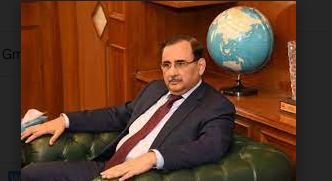DNA
ISLAMABAD, OCT 8: The Federation of Pakistan Chambers of Commerce and Industry’ Businessmen Panel (BMP) has asked the government to make a substantive drop in petroleum products following a huge cut in the global oil market by almost $9 per barrel and an immense recovery of the rupee to ease inflation to 27% in Oct, which has been hovering at around 31%.
FPCCI former president and Businessmen Panel Chairman Mian Anjum Nisar observed that the Pakistani rupee appreciated 2.7% to Rs283/dollar compared with the previous fortnight’s average of Rs292/ a dollar. In the same way, the price of petrol plummeted by 15% to $84.3 per barrel in the international market compared with last fortnight’s average of $99.3. The international price of high-speed diesel dipped by 10% to $110.6 per barrel compared with last fortnight’s average of $122.3.
Quoting a research report, he said that the price of Arab Light crude, which Pakistan imports from the Middle East, fell by 9.1%, or $8.9 per barrel, to $88.68 by October 5 compared to the average price of $97.58 for the September 18-29 period. Incorporating the drop alongside rupee appreciation and assuming the international prices and currency remain at the same level for the next 10 days, the local petrol and diesel prices should go down by Rs40 per litre and Rs20 per litre, respectively, in the next fortnightly price revision effective from October 16, 2023.
Mian Anjum estimated that exchange rate adjustments in the last fortnightly prices of petrol and diesel were Rs11.9 and negative Rs2.8 per litre, respectively. Even assuming the same currency adjustment for motor spirit/ petrol and nil adjustment for HSD in the upcoming fortnightly prices, the MS and HSD prices should be dropped by Rs29 and Rs20 per litre, respectively.
Moreover, Russia has surprisingly lifted the ban on export of diesel, which will create a supply glut for the premium product. This may spark a price war in the international market and benefit oil importing countries like Pakistan.
The caretaker government has already reduced petrol price by Rs8 to Rs323.38 per litre with effect from October 1, 2023. It cut diesel price by Rs11 to Rs318.18 per litre.
The BMP Chairman said that Pakistan heavily relies on imported fuels to meet domestic demand. Estimates suggest that it meets around 70% of energy needs through imports while the remaining 30% is met through local field production.
The share of energy, including gas, stood at around 26% ($2.17 billion) in total imports of $8.23 billion in the first two months of current fiscal year.
Pakistan’s demand for petroleum products hit a 44-month low at 1.06 million tons in September 2023 in the wake of a significant surge in prices over the past couple of months.
Besides, the availability of smuggled diesel, economic slowdown and a sharp drop in car sales also caused the decrease in demand.
He said that the illicit activities such as the black market and smuggling of Dollars in key sectors are draining Pakistan’s economy of a staggering $23 billion per year.
These clandestine operations, encompassing black market currency trade, oil smuggling, gold smuggling, and import controls, have detrimental effects on Pakistan’s economic stability. They distort exchange rates, leading to currency devaluation, which, in turn, can fuel inflation as imported goods become costlier. Moreover, such activities undermine the efficacy of monetary policies and erode confidence in the financial system.
In recent years, Pakistan has experienced significant fluctuations in its exchange rates, intensifying its economic challenges. A robust crackdown on these illicit activities has somewhat stabilized the interbank rate at Rs282.62 per dollar. He underscored that a steadfast commitment to eradicating smuggling in key sectors is essential for Pakistan’s economic recovery.
The most important part is governance, if governance is improved, it will lead to an overall improvement in financial and economic environment and bring stability to our financial markets and help economic and financial growth of the country.
He stressed the need for advanced surveillance techniques and technologies to secure Pakistan’s physical borders and crossing points.
We have a long border sharing with Iran and Afghanistan and then sea border with gulf countries. The smuggling of physical dollars and oil must be effectively controlled to prevent the outflow of foreign currencies.
According to the report, Pakistan loses around $150 million per month on account of dollar smuggling, culminating in an alarming annual figure of around $2 billion per year.
Similarly, he suggested that smuggled Iranian oil now commands a significant share estimated at over 30% of Pakistan’s diesel market. Around 10 million litre of diesel and two million litre of petrol are smuggled every day into Pakistan from Iran. This smuggled diesel eventually cost government over $1 billion annually.
Gold smuggling poses another challenge. The report revealed that, out of the significant gold market value of Rs2.2 trillion, only 1.32% or Rs29 billion is officially declared to tax authorities. This stark underreporting results from an annual smuggling of approximately 80 tons of gold into the country out of the total annual consumption of 160 tons. With regularization, this market could contribute a minimum of $500 million annually to government revenues.












